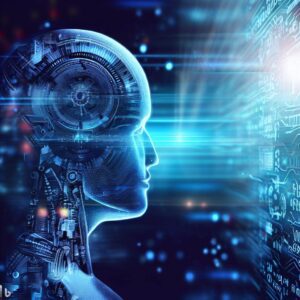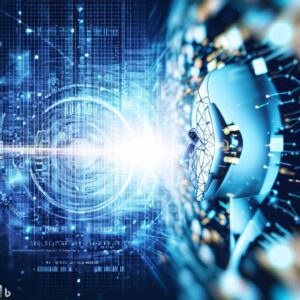In today’s fast-paced digital landscape, two fields that have gained remarkable prominence are artificial intelligence (AI) and data science. These innovative domains are shaping the future of industries, economies, and societies worldwide. From transforming business operations to advancing medical research, AI and data science are paving the way for unprecedented progress. In this article, we’ll delve into the fascinating world of AI and data science, exploring their significance, applications, and the synergies that drive them forward.
Introduction to Artificial Intelligence and Data Science
“Artificial intelligence,” or “AI,” refers to the creation of computer systems that are capable of carrying out tasks that traditionally require human intelligence. Problem-solving, education, reasoning, perception, and language understanding are some of these tasks that AI helps to easy human tasks. On the other hand, data science entails the extraction of important knowledge and insights from enormous data sets using a variety of techniques and algorithms.
The Intricacies of Artificial Intelligence
Machine Learning: The Heart of AI
The core of AI is machine learning. In order for machines to learn from data, it employs algorithms. Without explicit instructions, this technology enables computers to identify patterns, make educated estimates, and improve their performance.
Transforming Human-Machine Interaction with NLP
Better communication between humans and machines is made possible by natural language processing (NLP). NLP enables robots to comprehend, interpret, and produce human language, enhancing the naturalness and fluidity of communication.
Enhancing Visual Perception with Computer Vision
Machines can perceive and understand images and other visual details with the aid of computer vision. This technology can be used to run self-driving cars, detect objects, identify faces, and even assist in medical exams.
The Essence of Data Science
Collecting and Preprocessing Data
Data science begins with the collection and cleaning of data. Ensuring data accuracy and relevance is crucial for deriving meaningful insights and conclusions.
Unveiling Patterns through Exploratory Data Analysis
Exploratory Data Analysis (EDA) involves scrutinizing data to uncover patterns, trends, and outliers. This step is essential for guiding subsequent analyses and forming hypotheses.
Enabling Predictions with Advanced Modeling
Predictive modeling means using information from the past to make educated guesses about what might happen in the future. These models can be helpful for many things like guessing how much stocks will cost, understanding how people buy things, and studying how diseases get worse.
Converging Paths: AI and Data Science Unite
AI and data science are intertwined disciplines, with data science providing the fuel (data) that AI algorithms require to learn and improve. In turn, AI enhances data science by automating processes, identifying intricate patterns, and expediting decision-making.
Industries Transformed by AI and Data Science
Healthcare’s Intelligent Revolution
In healthcare, AI and data science are driving personalized treatments, drug discovery, and disease diagnosis. By analyzing vast datasets, these technologies offer insights that lead to better patient care and medical breakthroughs.
Financial Frontier: AI and Data Science in Finance
AI and data science are revolutionizing finance by predicting market trends, managing investments, and minimizing risks. These technologies enhance the accuracy of financial predictions and optimize investment strategies.
Retail Revolution through Customer-Centric Insights
Retailers utilize AI-powered recommendation systems to provide personalized product suggestions to customers. Furthermore, data-driven insights improve inventory management and elevate the overall shopping experience.
Ethical Dimensions of AI and Data Science
As AI and data science become integral to daily life, ethical considerations arise. Addressing algorithmic bias, ensuring data privacy, and mitigating the societal impact of these technologies are paramount concerns.
Future Trends in AI and Data Science
Streamlining Tasks Through Automation
AI-driven automation is enhancing efficiency across industries, reducing operational costs, and expediting workflows. Repetitive tasks can now be completed with unprecedented speed and accuracy.
Synergistic Collaboration: Interdisciplinary Approach
The future of AI and data science hinges on interdisciplinary collaboration. Experts from various fields will collaborate to tackle intricate challenges, yielding innovative solutions that harness the full potential of these technologies.
Empowering Decision-Making with Data-Driven Insights
Decision-makers are empowered by AI and data science with precise insights and predictions, enabling them to make decisions that promote growth and innovation.
Nurturing the Human Touch Amidst Technological Waves
Amidst technological strides, human qualities like creativity, critical thinking, and emotional intelligence remain invaluable. These uniquely human attributes complement AI and data science, ensuring a holistic and balanced approach to complex problem-solving.
The Road Ahead: Pioneering Progress
Artificial intelligence and data science are steering us into an era of transformation. As these fields evolve, it is imperative to uphold ethical standards, foster interdisciplinary collaboration, and preserve human ingenuity to fully harness their potential.
Conclusion
In conclusion, the fusion of Artificial Intelligence and Data Science is undeniably reshaping the present and future landscapes of technology. These two transformative fields are propelling us into an era of innovation, efficiency, and unprecedented insights. As AI learns and adapts from data, and as data science uncovers patterns and trends, their symbiotic relationship paves the way for advancements that were once mere dreams.
Frequently Asked Questions (FAQs)
1. Is artificial intelligence the same as data science? No, artificial intelligence focuses on creating intelligent machines, while data science involves extracting insights from data.
2. How does AI learn from data? AI learns from data through machine learning algorithms that identify patterns and adjust their behavior based on experience.
3. What is the primary benefit of data science in healthcare? Data science enables personalized medicine and more accurate disease diagnosis, leading to improved patient outcomes.
4. Can AI replace human creativity? While AI can assist in creative tasks, human creativity extends beyond algorithms and remains irreplaceable in innovative endeavors.
5. What role does ethics play in AI and data science? Ethics are pivotal in ensuring unbiased algorithms, safeguarding data privacy, and addressing the broader impact of AI and data science advancements.


